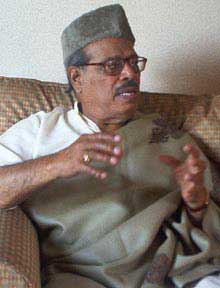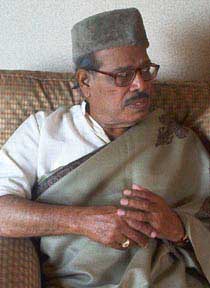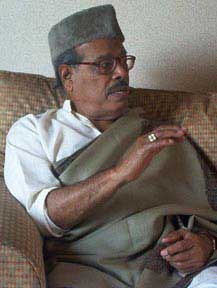Arts
Ai Mere Pyare Watan

At 84, Manna Dey is fit as a fiddle.
|
He is perhaps the last of the living legends among male singers, gifted with a unique voice no one has managed to ape till now. While you come across clones of other legendary singers in the present day world of vocal music, Manna Dey remains as original and incomparable through the years. At 84, he is fit as a fiddle, and recently sang for four hours to raise funds for the Robin Raina Foundation in Atlanta, a charity to aid under privileged children worldwide, because he deeply believes in the cause.
In an exclusive interview with Little India, the elegantly clad Dey talks about a life filled with music, his journey as a singer and composer and why in spite of the consensus he never received his due as a singer, he takes it all in his stride with humor and humility. In my formative years I was surrounded by music because of my uncle, the famous singer K.C. Dey, but until he became blind at the age of 13 and turned to music to support himself no one in the family was musically inclined. A benefactor took him under his wing because he thought my uncle was a musical genius, which he was, and made him learn at the feet of great ustads. Uncle in turn imparted that knowledge to my late brother and me, but he made it very clear that to deserve that kind of musical education, we had to desire and work for it. Other than that I don’t really come from a family of musicians, though several legendary musicians like Allauddin Khan Sahib, Inayat Khan, the late Vilayat Khan’s father and many other maestros visited our house, since they were my uncle’s contemporaries. We lived in a joint family and still do, in the same house where my father, uncle and I were born. Still it was made very clear to me by my father and my eldest uncle, who was an engineer and the self appointed decision maker for every one in the family, that I had to finish my education first and preferably do law. When I finished my undergrad studies, there were two choices before me, to study law or music. I chose the latter. My father wasn’t too pleased with my choice, but I got tremendous support from my uncle and started learning from him. K.C Dey never married, so I became the son he never had, and he was instrumental in helping me realize my dreams as long as I was willing to make the necessary sacrifices. Until then I had no formal musical education. Having said that I must add that like most Bengali house holds music was a part of our upbringing, so I would sleep and wake up to the sounds of music and subconsciously and consciously began to imbibe all that I had heard around me, and later when I did get into it, uncle did not have to teach me from scratch. So did you ever go through the tough regimen of learning music where the gurus punished their students-one hears stories of incessant hours of torturous practice, scoldings, Ali Akbar Khan was even tied to a tree! I’m afraid that is an approach I don’t think much of. My uncle was a hard task master, but never unkind or cruel. He was strict and the day I decided to become a singer he gave me a tanpura and expected rigorous practice from me. I was very fond of outdoor sports like boxing, wrestling, I used to love flying kites and had a very cavalier attitude and so when I should have been practicing music I would be out playing sports and in turn he would scold me but never in the horrible way some people treated their students. His concern was out of love and he wanted me to focus and apply my mind. He was the pioneer in introducing sugam sangeet or light music to the masses. Yes and actually a lot of people didn’t know that my uncle was a classically trained singer and used to sing dhrupad, dhamar, khayal, thumri, tappe and ghazal. He was very versatile, and in those days when every one was singing only classical, my uncle became a pioneer of sugam sangeet or light music. It was a master stroke. I can’t fathom how it even dawned on him that somehow the appreciation for classical music is very limited and that simplifying music would garner a much wider audience for him and it did. He modeled his music in a way that the common man could listen and identify with it. As a result he was worshiped in Bengal. When he started singing and working in Hindi movies and theatre, his songs became a rage all over India. I remember going to Karachi with him and when my uncle began singing songs like Baba Man ki Ankhen Khol and Teri Gathri Mein Laga Chor Musafir, the entire audience started singing with him. That was an unforgettable experience in itself. You yourself seem to be fonder of sugam sangeet even though you have amazing classical range and mastery.
You left Calcutta and went to Bombay to try your hand at singing there. How was the journey? I got my first break at the age of 22-23, when I sang Upar Gagan Vishal for the film Ram Rajya and was immediately branded as a singer of religious songs. I was constantly approached to sing for old bearded characters in movies and I was barely in my early twenties. It was a very trying time for me. I sang the song Chali Radhey Rani Akhiyon Main Pani for well known film maker Bimal Roy. It became a big hit and Bimal Roy said Manna have you seen the song on screen? I said no, he said you must go and see for yourself how deeply it continues to move the audience. I went and what do I see: another old man with a beard singing the song and I got so mad. I was in two minds whether to return to Calcutta or to stay on and not give up. Was it true that there used to be a clique and music directors stuck with certain singers and didn’t give other a chance. You have sung for so many legendary music directors. Can you share memories of those times. We were rehearsing the song and a close friend of mine Mr. Sharma was listening and came out and said Manna your voice is sounding very listless. There is no pizzaz. What are you singing? SD Burman retorted that on the contrary that was exactly the way the song was to be sung. It was being picturized on a man who was a poor kabuliwallah from Afghanistan who worked all day and would return to this crowded home he shared with others and while others would sleep, he would take out his rabab and sing yearningly of the land he left behind. I couldn’t have sung it in a robust manner. When music director Salil Chaudhry heard it he wept. Salil was a personal friend and not just a musical genius, he was also a writer par excellence and his lyrics were in great demand and are to this day even though he passed away long ago. He was an intellectual in the true sense of the word. Any time you sat down with Salil you returned enriched on so many other subjects. Shankar Jaikishan gave me some amazing songs to sing. I was closer to Shankar and he truly appreciated my voice and for 20 years the duo gave me songs that will remain evergreen for years to come. Their diversity and creativity was unbelievable I remember when Bharat Bhushan had become a big star, Mohd Rafi used to sing all his songs, Shankar created a beautiful song in his film Baiju Bawra which was being produced by Bharat Bhushan’s brother Shashi Bhushan. Shashi on finding out that I was singing the song came over and protested. He wanted Rafi to sing it. Shankar persisted and told him it was either me or he could find another music director. That s how I came to sing Sur Na Saje Kya Gaoon Mein which became a huge hit. After Shashi Bhushan heard that song he came and hugged me and acknowledged that no one could have sung it as well as I had. Shankar also gave you the opportunity to sing the duet Ketaki Ghulab Juhi with classical singing legend Bhimsen Joshi. How tough was that? My God that was a story in itself. Shankar told me Manna tighten your belt you are going to have the time of your life with the next composition. You are going to sing a classical duet with someone. They didn’t tell me who. I said sure and started practicing. After a few days I was told please come over, the tune is ready and the singer with whom I was to sing the duet was none other than Bhimsen Joshi. The duet was between the hero and his rival and I was supposed to sing for the hero and win. I got the shivers and said I can’t sing against Bhimsen Joshi and win, its impossible. So I went home and told my wife, lets abscond somewhere for a few days and come back when Shankar Jaikishan have found some one else and completed the recording. Anil Biswas also came up some brilliant compositions for me, but it was Roshan who really challenged me. You will understand what I mean if you listen to Na To Caravan Ki Talash Hai. Roshan warned me, Look Manna, Rafi is singing for the hero, but you are singing for the Ustad(maestro). The difference should show. When I rendered the alaap for that even Roshan was stunned. He said indeed you have proved yourself. Most music directors let me improvise, but Naushad Sahib was immovable. It was either his way or no way! C Ramchandra was very exacting too, but then I learnt a lot from him. He taught me how important clear diction and pronunciation were, and would not allow any word to be mispronounced. As it is, I’m very particular about pronunciation and you will see it in all my songs even the regional ones, but C Ramchandra was even more meticulous. Anil Biswas also said that you were the only singer who took notation for every song and had it done in one take, and that you could sing everything Rafi or Kishore or Mukesh or Talat Mehmood could sing, but they could not sing everything you sang. Tell me about Rafi. Not too many people know that you pulled Rafi out of a chorus line and gave him his break. Who did you enjoy singing with more, Lata or Asha? I have sung more duets with Lata than I have with any one else. I first met Lata at a rehearsal with Anil Biswas. I saw this dark, ill clad girl sitting nearby and after finishing my rehearsal , Anil said, “Manna this is the daughter of Dina Nath Mangeshkar. Have you heard her sing?” Her father had passed away and they had come upon hard times. I sat down to listen to her and the moment she started singing I realized this was a prodigy sitting before me. Both sisters are incomparable, but Asha is very versatile and singing with her meant impromptu improvisations, and we would go back and forth, testing and challenging ach other. It was a lot of fun. People say the two sisters wouldn’t let any one else come into the industry. I say even if that was true, there was still no one who could come close to them in terms of talent and hard work. Which is the song you look back at and say, what an amazing composition and I have done full justice to it? The one I sang for Manoj Kumar’s film Upkar, Kasme Vaade Pyar Wafa Sab. It was filmed on Pran who always acted as a villain in films. This was a sympathetic role for him and it changed the course of his acting career. He called me and said, Mannaji I’m getting an opportunity to have a song filmed on me for the first time. Manoj will explain my role to you, please don’t make it so tough that I can’t do justice to your rendition on screen. Manoj and I started rehearsing that song in the morning. in between he escorted me to a function where I had to sing and then we returned and finished the song. Manoj was so dedicated and the way he would immerse himself when I sang was very gratifying. What about Raj Kapoor? Even though he used Mukesh for most of his songs, he had you sing some wonderful numbers for him. Mehmood passed away recently. You have sung some amazing numbers for him, Ek Chatur Naar with Kishore, Phul Gendwa Na Maro. Mehmood had become the kind of actor, where films were written around him. How was the experience singing for him? People cannot stop raving about your Bengali compositions.
I have sung about 2,500 songs in Bengali and composed the music for about 95 percent of them. You won’t believe this, but every single household in West Bengal and East Bengal which is now Bangladesh has those songs. Wherever I perform they know each and every song of mine. If I forget the lyrics the audience hums it for me. It overwhelms me with gratitude. For me it is wonderful to see the large number of people that still love my songs. I sang before 5,000 people recently in New York. It was some sort of festival and I said to the organizers, “You want me to sing here where people are busy shopping and eating?” They said you don’t realize the power of your singing, just start. I did and people stopped everything and listened with such attention and in silence. Does it surprise you that we have not had a Manna Dey clone till this day while many people have cloned their voices on Rafi and Kishore? Well it’s no fault of mine! The voice is God given, but I have worked hard to improve it. I do have to say though that I recently heard a Maharastrian, a young man sing my songs, and some very difficult songs at that with such incredible beauty that I was totally surprised. He sang Laga Chunari Mein Daag so well that even I sat there amazed. I guess my voice and unusual style of renditions did help me carve a place for myself and maybe in general it is difficult to mimic. What do you think of today’s music? And why have you eased yourself away from singing in films? I still sing and do select shows. I’m in good health, both my daughters are wonderful singers and chose not to get into the industry. They saw the cutthroat competition between Lata and Asha and that put them off. Both of them are professionals. In fact my older daughter works for Sun Microsystems in California. I have a wonderful wife whom I love dearly and I live a disciplined life. More than anything else I am grateful that there are so many people who deeply appreciate the kind of music I believe in and show up to hear my songs. And that is good enough for me. |




You must be logged in to post a comment Login